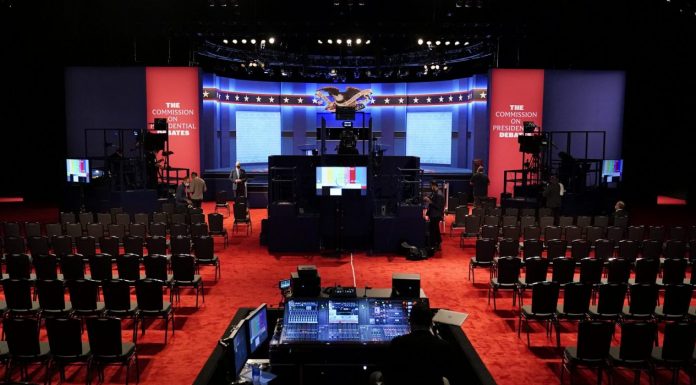(Headline USA) President Donald Trump and Democratic challenger Joe Biden hurtled toward Thursday night’s final debate, which may be the trailing incumbent’s best chance to change the race’s trajectory with just 12 days left until the election.
The two men headed for Nashville before the debate, which offers their final national stage to outline starkly different visions for a country.
Despite historic tumult wrought by the coronavirus panic’s crippling of the national economy, violent leftist rioting and a surprise Supreme Court vacancy, the race has remained largely unchanged.
While many media polls suggest that Biden holds advantages in key battleground states, the situation closely resembles Trump’s underdog position in the 2016 race against Hillary Clinton.
Leaked emails from the Democratic National Committee revealed at the time that her campaign had colluded with media and polling outlets to rig the results. Polls have continued to come under harsh scrutiny for oversampling Democrats by a considerable margin and asking leading questions that conservative voters are unlikely to respond affirmatively to.
The difference between Biden and Clinton in states that helped Trump to secure an Electoral College landslide is marginal, according to RealClear Politics.
However, Trump—who once enjoyed a healthy lead in fundraising—now faces a shortage of campaign cash in the final stretch.
Final debates often play an outsize role in electoral outcomes. But Thursday night’s showdown will be different from those past.
More than 42 million people have already cast their ballots as part of a pandemic-era rise in early voting—an effort backed by Democrats in spite of looming concerns about election integrity and the potential for vote fraud.
In an election dominated by the incumbent president’s larger-than-life personality, far fewer undecided voters remain than at this point in 2016.
And, in a visual reminder of the pandemic that has rewritten the norms of American society and fundamentally changed the campaign, sheets of plexiglass have been installed onstage between the two men.
The debate, moderated by NBC’s Kristen Welker, is a final chance for each man to make his case to a television audience of tens of millions of voters.
Tensions between the two candidates—and between Trump and Fox News moderator Chris Wallace—led to a hectoring performance during the first debate that put off many viewers as the three men proceeded to talk over one another.
In an effort to curtail interruptions this time, the Commission on Presidential Debates announced that Trump and Biden will each have his microphone cut off while his rival delivers an opening two-minute answer to each of six debate topics.
The mute button won’t figure in the open discussion portion of the debate. And it also remained unclear whether Welker would have the power to interrupt the speakers.
Trump already has publicly criticized the moderator’s selection, pointing to evidence that revealed her to be deeply biased.
Some advisers have urged him to trade his aggressive demeanor from the first debate for a lower-key style and put the spotlight on Biden, whom he derides as “Sleepy Joe.” But Trump made no such promise.
With a growing scandal surrounding the discovery of damning emails from the hard drive of Biden’s son Hunter, and the ensuing effort by Biden’s media allies to censor or discredit it, Trump seems certain to avail himself of the one platform where he can reliably reach a broader audience than his dedicated base of support.
On Tuesday, he called on Attorney General William Barr to immediately launch an investigation into the scandal.
Biden, who has stepped off the campaign trail for several days in favor of debate prep, expects Trump to get intensely personal.
Anticipating the pressure after facing questions recently about his favorite ice cream flavor, the former vice president preemptively aimed to spin the scandal as an effort to distract from the coronavirus, its economic fallout and other crises of Trump’s term.
“Hopefully he’ll play by the rules,” Biden said as he boarded his plane for Tennessee. “I’m looking forward to this.”
Biden could also expect questions about his comments in a CBS interview, released Thursday, in which he wouldn’t rule out trying to add justices to the Supreme Court. The issue has followed him since the Sept. 18 death of Supreme Court Justice Ruth Bader Ginsburg and the GOP-controlled Senate’s rush to confirm Trump’s nominee to succeed her, Judge Amy Coney Barrett.
Biden and Trump were both tested for COVID-19 on Thursday and the results came back negative.
Trump announced just two days after the first debate that he tested positive for the virus. He later spent three nights in Walter Reed National Military Medical Center before returning to the White House.
After Trump’s COVID diagnosis, the debate commission ruled that the second debate, which was to have been held last week, be virtual.
Trump balked, and the two men holding dueling town halls instead, speaking at the same time more than 1,000 miles apart.
As Trump continued to complain about his unfair treatment by the news media, he posted on Facebook unedited footage of his own “60 Minutes” interview, where he repeatedly told CBS interviewer Lesley Stahl she would not have challenged Biden.
“You wouldn’t say to Biden what you just said to me,” Trump told Stahl when she questioned his characterization of the economy prior to the pandemic. “If he had it, you would never say that to Biden.”
After posting the video, Trump tweeted: “Tonight’s anchor, Kristen Welker, is far worse! #MAGA.”
Adapted from reporting by the Associated Press

